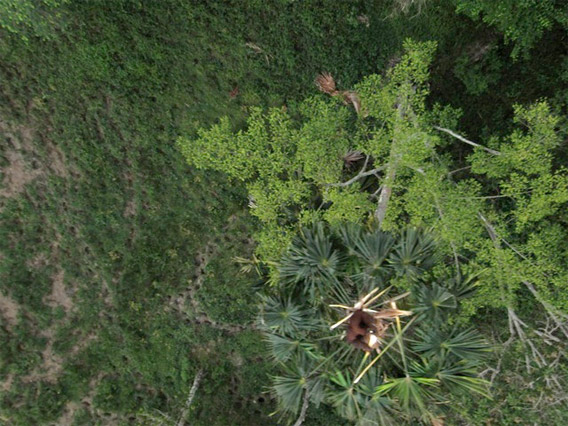
Orangutan as photographed by a conservation drone. Courtesy of Lian Pin Koh.
Google.org, Google Corp’s philanthropic arm, earlier this month pledged $5 million toward efforts combat wildlife poaching.
The grant is going to the World Wildlife Fund to help the conservation giant develop and implement technology that would allow rangers to better track wildlife populations and monitor protected areas for poachers. The program will involve “conservation drones” — remote aerial survey vehicles — as well as ground-based systems, including hand-held mobile devices.
“We are experimenting with this project to identify the ideal integrated tech system to detect and deter poachers and to be able to track wildlife,” Crawford Allan, WWF’s lead on the project, told mongabay.com.
The grant seems certain to boost emerging “conservation drone” systems. WWF-Nepal has been using low-cost drones built by Lian Pin Koh of ETH Zurich and Serge Wich of Liverpool John Moores University using off-the-shelf kit. But Allan said WWF “isn’t tied into any single type of system or vehicle” and expects the price point of the aerial system units to be in the “tens of thousands of dollars range”, effectively ruling out the remote-controlled planes used in Nepal and apparently signaling a new phase in conservation drone development.
“We will be finding a balance between capacity, range, durability and cost,” he said. “We are limited to systems that are affordable and replicable so we can scale up in future.”
Nonetheless, Koh said he hoped WWF would continue supporting the low-cost drone approach in Nepal and beyond.
“We are excited that Google is investing this sizable funds to develop new technologies for combating wildlife crime,” Koh told mongabay.com. “ConservationDrones.org has been working closely with WWF-Nepal for the past 10 months in terms of gaining local governmental and public support for the use of drones, seeking permission from civil aviation authorities for flying, and training local national park protection personnel on the operation of drones. We sincerely hope that Google and WWF can take full advantage of this momentum, and continue to invest in the application of this technology in Nepal.”
Koh added that he believes low cost drone technology is a “truly sustainable and replicable solution in the developing tropics.”
“We look forward to furthering our collaboration with WWF in their fight against wildlife poaching,” he said.
The Google.org’s grant to WWF will also support the development of software that could map and attempt to predict poaching activity as well as a mobile DNA sampling kit to help determine the origin of trafficked animal body parts.
Rhino with its horn sawed off for its own protection.
Google.org made the grant under its Global Impact Awards program, which “support organizations using technology and innovative approaches to tackle some of the world’s toughest human challenges.”
“Poaching of wildlife is a global problem that requires innovative technology and scalable solutions. WWF’s international campaign will work to combat increasingly sophisticated threats to some of the world’s most endangered species,” said Jacquelline Fuller, director of Giving at Google.
CORRECTION: Serge Wich’s affiliation was changed from Universitat Zürich to Liverpool John Moores University on Dec 19, 2012.
Related articles